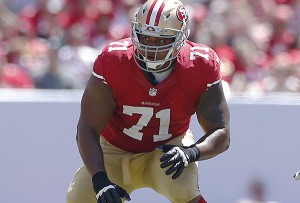49ers’ Player Stops Shoplifter with Punches – Could He Be Liable for Excessive Force?
On Thursday, January 8th, the 49ers offensive lineman Jonathan A. Martin, stopped a shoplifter by leveling him with multiple punches.
 There were two men involved in the shop lifting spree at a Versace Collection Store. The security guard tried to stop one while the other almost escaped. Martin saw the crime taking place and ran over. He punched the shoplifter “five to eight” times, according to Martin, who said in an interview that he wanted to do enough to subdue the suspect until the security officer could arrest him. Right after the incident, Martin tweeted: “Just took a dude out trying to rob a Versace store #CivicDuty”.
There were two men involved in the shop lifting spree at a Versace Collection Store. The security guard tried to stop one while the other almost escaped. Martin saw the crime taking place and ran over. He punched the shoplifter “five to eight” times, according to Martin, who said in an interview that he wanted to do enough to subdue the suspect until the security officer could arrest him. Right after the incident, Martin tweeted: “Just took a dude out trying to rob a Versace store #CivicDuty”.
Was This Martin’s Civic Duty? Or Could He Face Assault Charges?
Police officers and private citizens do have the right to use force when arresting a suspect. However, private citizens have far less protections than police officers. For example, a police officer can use deadly force if he has probable reason to believe the suspect committed or will commit a dangerous felony.
Private citizens can only use deadly force if the suspect already committed a dangerous felony. Citizens are not protected in the justice system if they use deadly force on a suspect based on reasonable belief they committed a felony.
How to Protect Yourself When Making a Citizen’s Arrest
Every private citizen has the right to make an arrest on a suspect if the suspect has indeed committed a felony. The citizen must have a reasonable suspicion that a crime is taking place in order to legally make the arrest. If the suspect was innocent or only committed a misdemeanor, then the citizen making the arrest could be liable for criminal or civil charges.
Citizen’s arrests do not require the same constitutional requirements as law enforcement arrests do. But when an officer asks a citizen to make an arrest, the citizen must uphold the same constitutional standards as a police officer.
When making an arrest, a citizen must only use the minimal amount of force needed to stop the suspect from committing the crime. Each state has different requirements for the use of deadly force. Overall, deadly force may only be used on a suspect if there is immediate physical danger to the arresting citizen or those around the area. If deadly force is used and does not meet the state’s requirements, the citizen may face manslaughter charges, murder charges, or a wrongful death lawsuit.
What about Breach of the Peace?
If Martin is charged with assault or battery, he could defend himself with the common law notion of “breach of the peace”. A citizen may use non-deadly force in arresting a suspect to prevent a crime from taking place or stop a crime that is taking place. Martin’s citizen’s arrest can be protected by breach of the peace, even if the crime was a misdemeanor, because he witnessed it taking place, and it would’ve ensued if he did not stop it.
His use of force, however, is not protected. If this incident went to trial, Martin’s use of force could easily be deemed unnecessary and too rough. The use of force in making a citizen’s arrest must be the minimum amount in order to stop the citizen from making the crime or getting away.
Since the price amount of the attempted stolen merchandise is unknown, we do not know if the suspect was committing a felony. Versace purses tend to be expensive, as everyone knows. The minimum price of stolen merchandise to be considered a felony is $500. The purses could have exceeded this number. If the purses were between $500 and $50,000, the suspect could face third-degree grand theft charges. But if the merchandise was under the minimum amount, the suspect did not commit a felony and Martin’s use of force will not be as protected.
Did Martin Use Deadly Force?
Martin is a trained professional athlete who could cause serious physical damage. Was his use of force necessary to stop a shop lifter at a retail store? At the moment, it looks like Martin will not be facing any charges, and his citizen’s arrest is legally justified based on the breach of the peace clause.

Comments